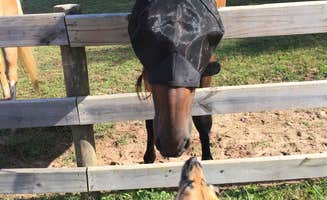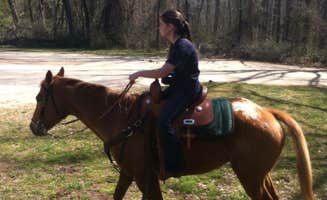Equestrian camping near Baldwin, Georgia centers around well-maintained trail systems that stretch along both Georgia and South Carolina sides of the Chattooga River. Campsites at specialized horse camps range from basic facilities to full-service options with electric hookups and dedicated horse amenities. The mountainous terrain sits at elevations of 1,500-3,500 feet, creating moderate temperatures even during summer months.
What to do
Trail riding along the Chattooga River: Access miles of well-constructed trails through Willis Knob Horse Camp. The camp offers nine dedicated horse-friendly sites with "sturdy highline posts provided but you need to bring your own ropes and other highland gear," according to camper Phyllis B. The trails are "wonderful and well-constructed to avoid deep mud" making them accessible in various weather conditions.
Guided mountain horseback rides: Visitors without their own horses can still enjoy equestrian activities at Trackrock Campground & Cabins. As Ellen S. notes, "I got to enjoy a lovely horseback ride on Chubby Checker with Sonya... that was the highlight of the trip for me." The working horse farm provides guided experiences suitable for various skill levels.
Fishing in mountain lakes: Several campgrounds offer lake access for fishing. At South Cove County Park, Mike K. describes "great fishing" in a "beautiful lake with crystal clear water." The multiple water access points make it easy to try different fishing spots throughout your stay.
What campers like
Private, wooded campsites: The horse-friendly campgrounds maintain a natural setting with good spacing between sites. At Cherokee Campground, Colin M. appreciates the "nice level lots" that are "very quiet" and mentions "the owner is a great person." The natural setting creates a peaceful environment for both horses and riders.
Clean facilities despite remote locations: Even though many equestrian campgrounds are in more remote areas, campers consistently mention facility maintenance. At Cherokee Campground, "the bath house is a little dated but always spotless" according to Colin M. This attention to cleanliness extends to the campgrounds themselves.
Access to multiple trail systems: Equestrian campers appreciate the connectivity between different trail networks. As Mark C. notes about Willis Knob Horse Camp, these are "some of the best Horse Camping in the Mountains, Great Horse trails that follow the Chatooga River." The variety allows for multiple days of different riding experiences.
What you should know
Weather considerations affect trail conditions: Mountain weather can change quickly and impact both camping and trail riding. At Don Carter State Park Campground, camper George & Patty C. advise, "We'll be back but in the Fall when it is a bit cooler!" noting that summer heat can be intense, especially in newer campgrounds where "tree coverage is a bit sparse for the time being."
Reservation requirements: Most equestrian campgrounds require advance reservations, especially during peak seasons. Sites fill quickly, particularly those with electric and water hookups for horse trailers with living quarters.
Limited cell service: Many horse camps have minimal or no cell reception due to their location in mountain valleys. At Watson Mill Bridge State Park, campers report that "phone service with ATT and Sprint/T-Mobile is non-existent at the campsite. 200 yards uphill at bathhouse service is available."
Tips for camping with families
Water activities complement riding: When family members need a break from horses, look for campgrounds with swimming options. At Oconee State Park Campground, Jay B. found "nice park with a lot to do close by" including "tons of hiking opportunities in the area with tons of waterfalls."
Playground facilities: Several campgrounds offer dedicated children's areas. South Cove County Park has "several large play areas in walking distance" according to Kelli P., who adds "We were impressed with the large number of pull through sites and the cleanliness of the campground."
Educational opportunities: Local wildlife and history can engage children when not riding. Crystal C. suggests at Don Carter State Park to "Do some animal watching or photography. From 6 in the evening and beyond you will find deer grazing in late summer and early fall, also raccoons and other small animals can be spotted roaming in some of the open areas."
Tips from RVers
Site selection for larger rigs: Horse trailers with living quarters need specific sites that accommodate their length. At Standing Indian Campground, John K. warns: "Unless there is another way into this lovely park that I am unaware of, I would not attempt to tow a 5th wheel or other large trailer to this location" due to "very narrow" roads, "very steep" hills, and "at least one very tight hairpin turn."
Hookup availability varies: Equestrian campsites have different levels of amenities. At Willis Knob Horse Camp, "Campsites each offer electric and water hookups, nice tent pads, lantern hooks, and big picnic tables" according to Phyllis B., providing comfort for longer stays.
Level sites are essential: Horse trailers require properly leveled parking areas. Jessica M. at Trackrock Campground reports: "Our 1st ever, in a 38' Class A. We were nervous about parking and getting set up- but they helped us get a spot that was easy to pull into." This assistance makes a significant difference when maneuvering larger rigs.




